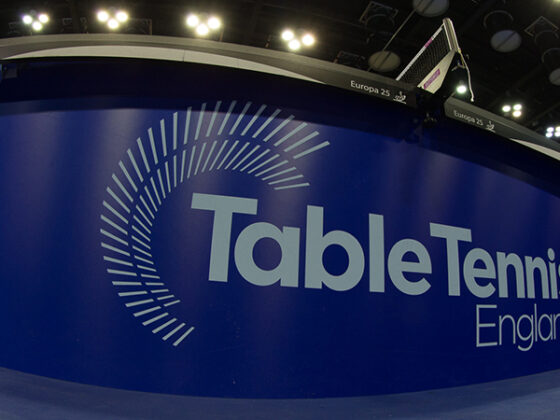The resolutions going forward to the Table Tennis England AGM on 17th July, and the rationales behind them, have been published.
A total of 25 resolutions have been proposed by the Board and by Company Members, addressing subjects including governance, fees and England squad performance.
They can be downloaded in full at the bottom of this page.
The Board has submitted 15 of the resolutions, a number of them amendments to the Articles of Association recommended by Rules Committee to bring them into line with changes in company law or to provide greater clarity. These cover such subjects as voting units, honorary appointments, company membership, proxy voting and the ability of members to call a General Meeting.
We have heard from members that the current voting structure effectively allows for a member who plays in multiple leagues to be represented multiple times in AGM voting. The Board recognises that this is not necessarily a fair representation and therefore proposes that players who play in more than one league will be required to identify their primary league in the TT Memberships system for voting purposes and will only count towards the voting strength of that league and county.
There are a number of resolutions relating to Elected Directors, with similar propositions being submitted by both the Board and by Peter Charters, Berkshire County Company Member. There is agreement that Elected Directors should serve a full four-year term and that their term of office is not linked to starting and finishing at an AGM, as it has been historically. Likewise, the Board supports a change from the name of Deputy Elected Chairman to Elected Director and that one Elected Director will be formally appointed by the Board as the Deputy Chairman.
In addition to the Board resolutions, a total of 10 resolutions have been proposed by Company Members. Some of these will be supported by the Board, including one from Chris Dangerfield, Shropshire National Councillor, requiring the votes of each Company Member to be retained for at least six months after a General Meeting and made available to League or County General Secretaries upon request, so they may confirm how their Company Member voted.
The Board has also agreed that it will establish an England Performance and Player Development sub-committee of the Board, the principle of which is proposed by Neil le Milliere, Kent National Councillor. This committee will be involved in recommending KPIs to the Board. Therefore, the Board would ask that this new committee is given that task, which is a responsibility of the Board, and therefore does not support the resolution from Peter Charters for the AGM to set performance KPIs.
The Board will oppose the resolution submitted by Chris Dangerfield proposing that all members are refunded in full for any membership they purchased for 2020/21, by offsetting the cost against their 2021/22 membership. The Board did consider this as an option in its discussions at the March Board meeting. It is not financially viable for the association to do so. It would represent a reduction in income this financial year of more than £223,000 which would impact important programmes and put some jobs at risk. The reserves are currently sitting at £433,082, which is already below the targeted threshold of three months’ running costs, which is currently £457,710.
The Board fully appreciates that some members who have taken out a membership this year may not play at all and everyone else will have had a severally impacted season in any event. Current Compete members wishing to claim a 50% discount on the 2021/22 membership fee can do so and a full refund of this year’s Compete Plus licence has also been offered. The Board is also proposing a freeze of membership fees, keeping them at the same level for a fourth season in a row.
The support of the membership through affiliation fees supports a lot of different aspects of our work, much of which has continued through the pandemic. We are extremely grateful to those members who renewed in 2020/21 and we look forward to many more returning in the forthcoming season as playing resumes.
Berkshire National Councillor Peter Charters has submitted two other proposals relating to the procedure for appointing Directors. The Board agrees with the principles and has already taken these into account in the current live, open application process for appointed and independent directors.
Peter Charters has also submitted a resolution to increase the number of Elected Directors on the Board from three to four. The Board acknowledges that this is founded in a desire to increase the voice of the membership within the Board. The Board is capped at a maximum of 12 Directors including the Chairman and Chief Executive, three Elected Directors and seven Appointed Directors. It is important that the Board has a diverse mix of table tennis and professional experience and skills. It is also important that the Board reflects the diversity of the table tennis family in terms of age, gender, ethnicity and other characteristics. The membership are central to the Board and with a change in the definition of what constitutes an independent director (which can include an active playing member) it will be further enhanced without the need to increase the number of Elected Directors.
The Board recognises that the Articles need to be amended in future to reflect gender neutrality and diversity and this will be addressed taking account of the member consultation exercise which is helping to shape our overall Diversity Action Plan, and in line with industry best practice.
The full list of all Members’ and Board resolutions and the rationale explaining them can be downloaded below. All changes to the Articles of Association are Special Resolutions and require a 75% share of the vote in order to pass. Ordinary Resolutions require a simple majority.
The Board has also confirmed that the AGM will be a virtual meeting. We are aware that, with lockdown restrictions starting to ease, some members would have preferred a physical meeting. Conversely, several members would not feel comfortable coming together physically and it is not possible to know what restrictions may or may not be in place for mid-July.
The Board agreed that the health and safety of members was paramount, and that it was not appropriate to trial a hybrid meeting at this AGM as it would be difficult to ensure everyone was involved in the proceedings. Having now managed two virtual General Meetings and four virtual National Council meetings, the process is well managed.
All eligible participants will be given the opportunity to speak in accordance with Standing Orders and the Mi-Voice system will be used to ensure online voting during the AGM is accurate and robust.





